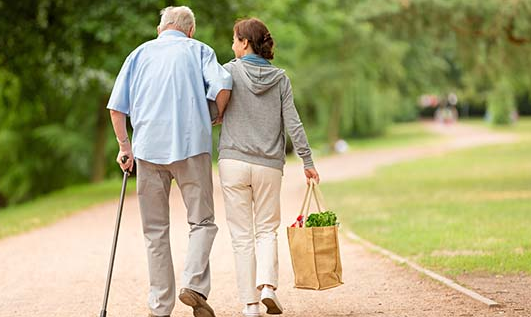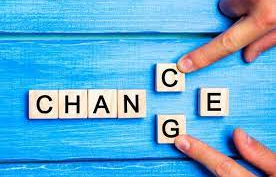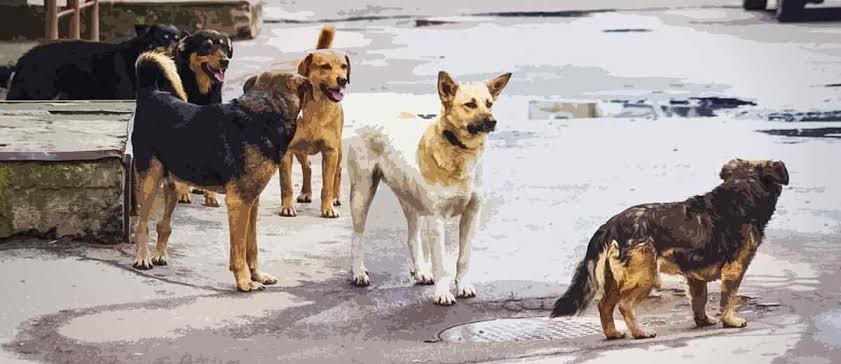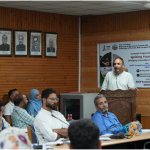Getting older is not easy, but sooner or later, it will happen to us all. Traditionally, the “elderly” are considered to be the persons with age 65 and older. We are actually very fortunate to have older people around us, whether as family, friends, or just general acquaintances. Older people are fonts of wisdom and experience. They can inspire us to continue working and also warn us of dangers ahead that we are unaware of. Many citizens live in joint family units, with the elders acting as the head of the household. The elders are supported by the younger members of the family and they in turn play a key role in raising their grandchildren. Population ageing is one of the most discussed global phenomena in the present century. Countries with a large population like India have a large number of people now aged 60 years or more. The population over the age of 60 years has tripled in last 50 years and will relentlessly increase in the near future.
From the beginning of the human civilization, taking care of old family members was considered very important and there were also mostly joint families that time with people mostly living with their grandparents or parents even after becoming adult. However in the modern world this system has completely changed and today we rarely see people living with their parents after getting adult. In the past taking care of the older people of the family was considered a very important duty which is still the case in some cultures around the world however things are changing rapidly there also. Industrial revolution was a major time period that brought this change as the working people got very busy in their work that they barely had a time to give to their elders and since then older people also started to living alone separated from their children so that inconvenience couldn’t be caused in their lives.
There are various advantages also to be in the company of the older persons like youngsters can learn a lot from the older people through their wisdom and experience that they learned throughout their life. They give unconditional love, kindness, patience, humor, comfort, lessons in life. The fact that people live longer than ever before, and that we have an ageing population, should be something to celebrate. After all, the alternative to living longer is not great. Older members of our family have often lived through wars or seen harder times and can be a source of inspiration for younger family members. Their stories of adversity, or simply of navigating life over a long time, help children to realize that life can be navigated through determination and hard work. Just as importantly an older family member can often provide the role of mentor, encouraging and inspiring a younger child to chase their dreams. At times when a parent-child relationship is challenging, a grandparent can become an extension of the unconditional love provided by family. Older members of a family bring wisdom, calm, dependability and unconditional love that frame the views of the broader family and shape the future of younger generations.
People worldwide are living longer. Today most people can expect to live into their sixties and beyond. Every country in the world is experiencing growth in both the size and the proportion of older persons in the population. According to census 2001, older people were 7.7% of the total population, which increased to 8.14% in census 2011. The increases in the elderly population are the result of changing fertility and mortality regimes over the last 40-50 years. By 2030, 1 in 6 people in the world will be aged 60 years or over. By 2050, the world’s population of people aged 60 years and older will double. The number of persons aged 80 years or older is expected to triple between 2025 and 2050 to reach 426 million. A longer life brings with it opportunities, not only for older people and their families, but also for societies as a whole. Additional years provide the chance to pursue new activities such as further education, a new career or a long-neglected passion. Older people also contribute in many ways to their families and communities. Yet the extent of these opportunities and contributions depends heavily on their health.
Older persons have a range of care needs beyond the health and basic needs for daily living. Besides expertise and finances, social and cultural attitude and political will, social care, safety and security, companionship, love and respect are some of the needs which need to be addressed adequately. It seems there are many unmet care needs of the older persons in different societies, these needs should be identified and supported through appropriate measures. From an absolutely independent life, the dependency upon others begins, initially for more complex activities to relatively simpler activities of daily living, until the very basic ones fade. The age at which that happens differs individually considering many factors including mostly physical and mental illnesses. However it may also differ in different cultures and societies. These issues are well recognized across countries; however the remedial actions are not adequately evident. When the care of the elderly is discussed, emphasis is usually given to the basic needs for living and the health related issues which are obviously important. However, it is true that most countries struggle to meet even these basic needs effectively. There are issues of poor planning, infrastructure, socio-political and legal frameworks, bringing in constraints on the care provisions for the elderly.
Caring for elders means being loving and giving towards them. Taking care of elders is an honorable and compassionate thing to do, no matter what age we are. Caregiving is a job and journey that demands a great responsibility. Our elders may not have as much energy as we do, so we should be with them to care for. Below are the tips for taking care of our elders:
Listen to them
One of the most important ways to make our elders feel loved and cared for is to listen them. How they speak or relate to us may be different than what we are used to due to the age difference, but its best just to be respectful and compassionate no matter what they want to share.
Personal Care
Many elders struggle with mobility and might need some help around the house. Tasks may be difficult or impossible to perform on their own. We should help them to move them around, to take them to wash room, to accompany them to bank and to a doctor. To help them in bathing, washing and dressing. To change and make their beds. To clean their clothes and rooms. This can help them feel more comfortable and less worried about getting things done.
Be polite to them
We should be polite to our elders even if they ask the same questions over and again. Respond in a calm tone when they need something. If they are talking, listen patiently without interrupting them. This shows that we value and respect them.
Spend time with them
One of the greatest ways to show care to elders is by spending time together. Spend time getting to know them. Watch a favorite television show, take a walk in the park together, have atleast dinner together. Play light games with them. They shall feel happy when we are with them even for a little period of time.
Ask for advice
Our elders are some of the best people to go to for advice. They have lived much longer than we have and had lots of experiences, both good and bad, to share with us. If we have something weighing on your mind, bring it to elders to discuss and it will also make them feel appreciated and valued.
Give gifts
Giving them thoughtful gifts show that we care about them. Think about what our elders might appreciate, and then make a kind gesture. Remember their birthdays and other special days and give gifts to celebrate. They will feel charming while we celebrate it together.
Invite them to events
We should invite our elders to our sports games, concerts, plays, recitals, birthday parties, graduations, and other events. They will likely enjoy being included and feeling like a part of our life. Have a special place for them to sit in such events, they will feel honoured.
Healthcare
We should be much careful about elders on how they are doing with their health because health can decline with old age. We should arrange their visits to doctor, arrangement of medicines for them, check their BP and do other tests regularly, to make sure they are doing alright. Attending routine and specialized doctor’s visits with our elders not only show our support, but it’s a smart way to be aware of what is going on with their health. They will like all these services.
Physical Activity
Our elders may not be able to move around a lot but light physical activity is important to keep them healthy and engaged. This could include walking and shopping together, or planting in the flower and kitchen garden but be sure the level of physical activity isn’t too strenuous as this could increase the risk of injury. Encourage them to make physical activity a priority to help them stay active.
Mental Health
In addition to keeping their bodies active, it’s equally important to keep their minds active. There are many options for this, including books, puzzles, knitting, coloring, painting, and so much more. As long as the activity is engaging and requires participation on the part of our elders, it will improve their spirits and make them less burdensome.
Teach technology
The world is ever-changing and that can be a bit paralyzing to those in the older generation. We should introduce our elders to technology like internet, email and paying their bills online.
(M Ahmad is a regular writer for this newspaper and can be reached at [email protected])








